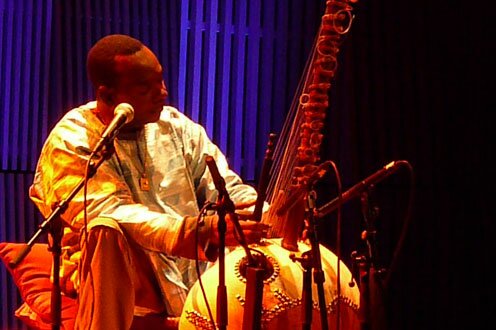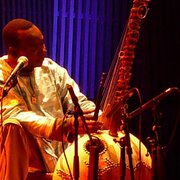- country:Mali
- style(s):Afro, Early Music
- label:Odaras Records
- type:Band, Solo, Duo
- gender:male
- instrumentation:instrumental
- artist posted by:Odaras Productions
Line up
- Toumani Diabaté (Kora)
Links
Toumani Diabaté is one of the most creatively prolific and successful musicians on the African continent, and was described by the Observer as ‘one of the world’s most pre-eminent musicians in any genre’. He plays the kora, a harp with 21 strings unique to West Africa. More than any other kora player, it’s Toumani who is responsible for bringing this instrument to audiences around the world. He’s a performer of truly exceptional virtuosity and creativity – someone who has shown that the kora can rival the world’s greatest instruments.
Toumani was born in Bamako, the capital of Mali, in 1965 into a family of griots (hereditary musician/historian caste) whose lineage stretches back 71 generations, father to son. His father, Sidiki Diabaté (c. 1922-96), was a kora player of legendary fame in West Africa – dubbed King of the Kora – who became famous for his virtuoso “hot” and idiosyncratic style of playing, echoes of which can be heard in Toumani’s style. Sidiki’s first wife, Toumani’s mother, was the singer Nene Koita.
Despite the musical environment in which Toumani was raised, he was self-taught, never learning directly from his father except by listening. He began playing the kora at the age of five at a time when the Malian Government was engaged in an active programme of encouraging regional ensembles to represent local traditions. Toumani was recruited to the ensemble from Koulikoro (some 60 kms east of Bamako) with whom he made his public debut at the age of 13 to great local acclaim. In 1984 Toumani joined the group of brilliant young musicians who accompanied the great diva Kandia Kouyate.
Toumani first came to the Europe in 1986 to accompany another Malian singer, Ousmane Sacko, and ended up staying in London for seven months. During this period, at the age of 21, he recorded his first solo album Kaira, the first ever solo kora album and still a best seller. In 1986 Toumani also made his first appearance at a WOMAD festival and made a significant impact.
In the UK, Toumani met and worked informally with musicians from many different fields of music. His first major recorded collaboration was with the Spanish flamenco group Ketama. The resulting album Songhai, with pieces like ‘Jarabi’, was a perfect synthesis of kora and flamenco.
In 1990 Toumani formed the Symmetric Orchestra, a name that evokes perfect balance or ‘symmetry’ between
tradition and modernity and between the contributions of musicians from a number of closely related countries. Senegal, Guinea, Burkina Faso, Ivory Coast, and Mali itself, were all part of the medieval Mandé Empire and Toumani had the idea of recreating its cultural equilibrium in a modern musical context.
The orchestra name was first used on CD for the elaborate projet Shake The Whole World released in 1992 in Japan and Mali only. Maintaining a weekly residence at the Hogon in Bamako throughout Toumani’s career, the group continued to evolve and grow, culminating in the release of the acclaimed album Boulevard de l’Indépendance in 2005, and the extensive international touring that followed.
In the early to mid 1990s, Toumani began to gather a number of exceptionally talented musicians around him, such as the brilliant Bassekou Kouyate on the ngoni, and Keletigui Diabaté on balafon. He cultivated a type of jazz-jugalbandi-griot instrumental ensemble which can be heard on his album Djelika, released in 1995. In the same year Toumani travelled to Madrid to record Songhai 2.
In 1998 Toumani recorded a kora duet album with Ballake Sissoko; their respective fathers released the 1970s classic Cordes Anciennes (Ancient Strings), so the new album was called New Ancient Strings. It was their tribute to the original record and an attempt at bringing such material to a modern audience.
They say that the blues comes from Africa, so it seemed entirely natural that Toumani should collaborate with the bluesman Taj Mahal. Their groundbreaking album Kulanjan was released in 1999. Constantly on look out for ways to evolve and innovate, Toumani’s next album MALIcool was a collaboration with the American free jazz trombonist Roswell Rudd that took another step out towards the edge. The arrangements are sparse, leaving everybody room to improvise, and there are a few unexpected pieces such as an interpretation of Thelonius Monk’s ‘Hank’, a swinging version of a Welsh folk song, and a leftfield take on Beethoven’s ‘Ode to Joy’.
Toumani has participated in many other recording projects both at home and abroad: he appears on Ali Farka Touré’s eponymous debut album for World Circuit; he toured with Salif Keita and appears on his acclaimed albums Papa and Mbemba; he was part of Damon Albarn’s Mali Music project; he’s featured on Kasse Mady Diabaté’s 2004 Grammy nominated album Kassi Kasse, and in 2007 he featured on the track ‘Hope’ on Björk’s album Volta, which lead to an inspired guest appearance on her set at the Glastonbury Festival.
Toumani has enjoyed recognition for his contributions to the development of the kora and African music in general. In 2004 he received the Zyriab des Virtuoses, a UNESCO prize awarded at the Mawazine Festival in Morocco. He’s President and Director of Mandinka Kora Productions, who actively promote the kora through workshops, festivals, and various cultural events. He’s also a teacher of the kora and of modern and traditional music at the Balla Fasseke Conservatoire of Arts, Culture and Multimedia in Bamako.
In 2004, Toumani began working with World Circuit on a trilogy of albums recorded at sessions in the Mandé Hotel in Bamako. The first release was the duets album In the Heart of the Moon, recorded with the great Ali Farka Touré, which won the Best Traditional World Music Album GRAMMY Award. Second in the trilogy was Boulevard de l’Indépendance by Toumani Diabaté’s Symmetric Orchestra. The third was Ali Farka’s final solo album Savane. Toumani accompanied Ali on his last concert tour in the summer of 2005 during which they spent 3 days in a London studio recording Ali and Toumani, the follow up to In the Heart of the Moon, which also won a Grammy.
Taking time out from their weekly residency at Bamako’s Hogon club (recently moved to Le Diplomat), Toumani Diabaté and his Symmetric Orchestra proved a revelation when they headlined venues such as New York’s Carnegie Hall or festivals such as Glastonbury, Nice Jazz Festival, and Montreal Jazz Festival.
Toumani was also busy working on his next album The Mandé Variations, released in February 2008. It’s an all-acoustic album, Toumani’s first solo kora work since his groundbreaking debut album Kaira, released over twenty years before. Both the album and subsequent solo recitals were met with universal critical acclaim. Toumani performed a special concert with the London Symphony Orchestra and the year came to a climax with another GRAMMY Award nomination and an NAACP Image Award for The Mandé Variations. Toumani was appointed UNAIDS Goodwill Ambassador in December 2008, using his music to spread awareness on HIV and AIDS.
2010 proved to be another prolific year for Toumani. The album Ali and Toumani was released at the start of the year to universal praise. Following its release, Toumani and his band played his interpretations of the music of Ali Farka Touré in a series of special concerts appropriately called The Ali Farka Touré Variations Tour, which included a special show in Paris with Ali’s son Vieux stepping into his father’s role for one night only.
That summer saw the premiere of AfroCubism, an all-star group featuring the finest musicians from Cuba and Mali, including Toumani. In 1996, a group of Mali’s finest musicians were due to fly into Havana to collaborate with some of Cuba’s most brilliant singers and instrumentalists. For reasons that have never been made clear, the Malians never arrived. A very different album was recorded: The Buena Vista Social Club. The rest, as they say, is multi-million selling history. World Circuit finally brought the original invitees together with a stellar line-up of additional talent at a series of inspirational sessions and the great lost Afro-Cuban album Afrocubism was released fourteen years after originally planned.
Toumani celebrated his second GRAMMY Award for Ali and Toumani in 2011. He also embarked on a new collaboration, this time with the Brazilian artists Arnaldo Antuñes and Edgard Scandurra, resulting in the album A Curva a Cintura.
The crisis that hit Mali in March 2012 had a deep effect on Toumani. He learned about the military coup that toppled President Amadou Toumani Toure when he was on his way to Wales to collaborate with the harpist Catrin Finch. Nightlife in Bamako, and the livelihoods of many musicians were extinguished for a while. The Islamist take over of the northern two-thirds of the country and the banning of music there also provoked profound antipathy in Toumani, who is not only one of Mali’s most famous musicians but also a devout Muslim.
In March 2014 SOAS (the School of Oriental and African Studies) announced that Toumani Diabaté is to be awarded an Honorary degree of Doctor of Music (D.Mus) in recognition of his influential work in raising awareness of the kora and the traditional music of Mali around the world and his contribution to Mande scholarship, (which Mr Diabaté and his family have been involved with since the 1st Mande Studies Conference at SOAS in 1972). The only other musician to have received an Honary degree is the acclaimed pianist Daniel Barenboim, in 2008.
Mali’s recent tragedy was one of the main impulses behind Toumani’s decision to record an album of duets with his son, Sidiki Diabaté, a hugely talent kora player and a successful hip hop artist. He wanted to present the 72nd generation of Diabaté griots to the world, but also reaffirm his belief that Mali’s most precious assets are its music and culture, its traditional faith and the bonds that bind its many different peoples.
Arnaldo Antunes & Toumani Diabaté, the divine encounter of 2 musical continents.
Have in common Brazil and Mali except that music belongs in Sao Paulo as in Bamako from people everyday, everything is a pretext to move and dance. So in 2010, when Arnaldo Antunes, the poet hoarse and fellow guitarist Edgard Scandurra meet Toumani Diabate, he had never heard of, this is the first surprise. The surprise at an unknown instrument, the kora surprise which becomes magic when the melodies work with the virtuosity of 21 strings of the famous griot. Follows a 2 week trip to Bamako will give birth to this enchanting album. Alternately haunting and dancing. Throbbing through the melancholic voice of Arnaldo Antunes accompanied by the traditional kora of Toumani Diabaté, more rock when the master leaves room for her son Sidiki, more able to keep pace with an electric kora it distorts brilliantly to shots wah pedal. And to end it all, a poignant tribute to Serge Gainsbourg with superb recovery Elisa Version samba-kora! A striking album, rock mixture MPB (for “Brazilian popular music”) and folk Mandingo with a touch of pop!



